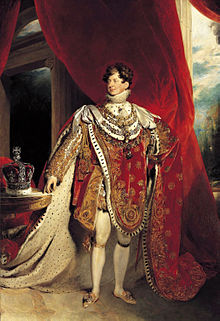

King of the United Kingdom
12 August 1762 St James's Palace, London
26 June 1830(1830-06-26) (67) Windsor Castle, Berkshire, United Kingdom
NamesGeorge Augustus Frederick
King of the United Kingdom and Hanover from 1820 to 1830 For other uses, see George IV (disambiguation). King of the United Kingdom and Hanover George IVCoronation portrait by Thomas Lawrence, 1821King of the United Kingdom and Hanover (more...) Reign29 January 1820 – 26 June 1830 Coronation19 July 1821PredecessorGeorge IIISuccessorWilliam IVBorn(1762-08-12 ) 12 August 1762 St James's Palace, LondonDied26 June 1830(1830-06-26) (aged 67) Windsor Castle, Berkshire, United KingdomBurial15 July 1830 St George's Chapel, Windsor CastleSpouseMaria Fitzherbert (m. 1785, unrecognized) Caroline of Brunswick (m. 1795; died 1821)IssuePrincess Charlotte of WalesHouseHanoverFatherGeorge III of the United KingdomMotherCharlotte of Mecklenburg-StrelitzReligionProtestantSignature George IV (George Augustus Frederick; 12 August 1762 – 26 June 1830) was King of the United Kingdom of Great Britain and Ireland and King of Hanover from the death of his father, King George III, on 29 January 1820 until his own death ten years later. He had already been serving as Prince Regent since 1811, during his father's final mental illness. George IV was the eldest child of King George III and Queen Charlotte. He led an extravagant lifestyle that contributed to the fashions of the Regency era. He was a patron of new forms of leisure, style and taste. He commissioned John Nash to build the Royal Pavilion in Brighton and remodel Buckingham Palace, and commissioned Jeffry Wyatville to rebuild Windsor Castle. George's charm and culture earned him the title "the first gentleman of England", but his dissolute way of life and poor relationships with his parents and his wife, Caroline of Brunswick, earned him the contempt of the people and dimmed the prestige of the monarchy. He excluded Caroline from his coronation and asked the government to introduce the unpopular Pains and Penalties Bill in an unsuccessful attempt to divorce her. Despite presiding over the British Empire's emergence as a global hegemon, his rule was tarnished by scandal and financial extravagance. His ministers found his behaviour selfish, unreliable and irresponsible, and he was strongly influenced by favourites. Taxpayers were angry at his wasteful spending during the Napoleonic Wars. During most of George's regency and reign, Lord Liverpool controlled the government as Prime Minister of the United Kingdom. Liverpool's government presided over Britain's ultimate victory over Napoleon and negotiated a peace settlement with the French. After Liverpool's retirement, George IV was forced to accept Catholic emancipation despite opposing it. His only legitimate child, Princess Charlotte, predeceased him in 1817, so he was succeeded by his younger brother, King William IV.

We use cookies
We use cookies and other tracking technologies to improve your browsing experience on our website, to show you personalized content and targeted ads, to analyze our website traffic, and to understand where our visitors are coming from. Privacy Policy.